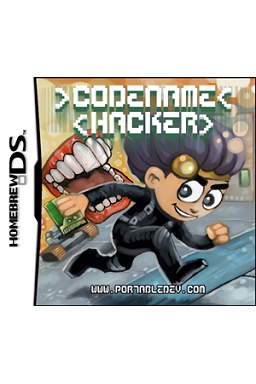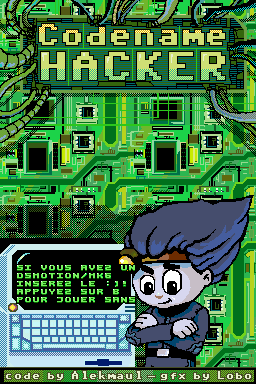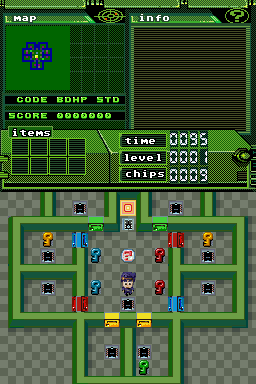More actions
m (Text replacement - "|download=https://dlhb.gamebrew.org/dshomebrew2/↵" to "|download=https://dlhb.gamebrew.org/dshomebrew2/") |
No edit summary |
||
| (One intermediate revision by the same user not shown) | |||
| Line 8: | Line 8: | ||
|version=1.1 | |version=1.1 | ||
|license=Mixed | |license=Mixed | ||
|download=https://dlhb.gamebrew.org/dshomebrew2/ | |download=https://dlhb.gamebrew.org/dshomebrew2/codenamehacker_1.1.zip | ||
|website=http://www.portabledev.com/pages/ds/jeuxdev.-perso/codename-hacker.php | |website=http://www.portabledev.com/pages/ds/jeuxdev.-perso/codename-hacker.php | ||
|discussion={{Tick}} | |||
|donation=https://portabledev.itch.io/ | |donation=https://portabledev.itch.io/ | ||
}} | }} | ||
Latest revision as of 11:57, 20 August 2024
| Codename Hacker | |
|---|---|
 | |
| General | |
| Author | Alekmaul |
| Type | Puzzle |
| Version | 1.1 |
| License | Mixed |
| Last Updated | 2008/08/20 |
| Links | |
| Download | |
| Website | |
| Support Author | |
Codename Hacker is a DS adaptation of the game Chip's Challenge, a top-down tile-based puzzle game originally published in 1989 by Epyx as a launch title for the Atari Lynx. This homebrew is modified upon the GBA version of Chip Challenge (also made by Alekmaul) that contains around 300 levels.
It was submitted to the NEO Summer Coding Compo 2007 (NDS Game, 2nd place).
Installation
Download and extract file.
DLDI patch it if needed (most new carts have auto DLDI-patching) and copy it to the root directory of the card.
User guide
Intro
Chip would do anything for Melinda the Mental Marvel. More than anything because he wanted to join Melinda's exclusive computer club - the Bit Busters. So you can imagine how Chip felt when Melinda sat down next to him in the school cafeteria and offered him membership...on one condition.
Take control of Chip as he does some heavy interfacing with a few interesting puzzles. Melinda will monitor your progress as you enter and work your way through 149 levels of challenging maze-like paths and puzzles. Once you accept the challenge, there's no escape. Monsters, traps and the ticking of the clock all conspire to delete you before a level is completed.
You must ram blocks of soil together to create bridges over water traps, or use them as buffers against cherry bombs. Invisible partitions will impede your progress. Coloured keys will open doors that kead to other keys that will open still more doors! To make it through, you must keep puzzle sequences stored in your memory.
Most levels have a specific number of chips that you must collect before you can progress to the next level. Sometimes you must snatch those chips from under the very noses of deadly bugs who are just aching to take a byte out of you!
Well Chip, are you still up for the challenge? You can't get that Bit-Busters T-shirt out of your system, can you? OK buddy, make tracks for level one of Chip's Challenge!
Gameplay
In Codename Hacker, you are Chip, a computer enthusiast. To enter a computer club and impress a girl, you must pass all the levels of a game.
The goal in each level is to collect a set amount of the processors in order to move to the next level, within a time limit. You can go back to a level by a password system.
There are colored keys to open doors of the same color, switches that do certain things, walls that are secret passages, etc...
Puzzle parts
Traps:
Must be disarmed before you can pass through them. You can disarm traps by strategically placing the dirt blocks. There are various sorts of traps:
- Some hold you prisoner until your time runs out.
- Others destroy you as soon as you step on them.
Force Floor Traps:
Conveyor belts that propel you with lightning speed from one area to another without allowing you to stop.
Sometimes you can use this force to propel you to a desired location, however most of the time you will need to collect a magnet to neutralise the effect.
Fire Traps:
Impassible bonfires laid out to block your progress.
Use a fire shield to walk through fire traps.
Water Traps:
Can be crossed in two ways, either build a bridge of dirt blocks or have a water shield in your inventory.
Ice Traps:
Slippery obstacles that make you slide right past your goal.
Cleats are required to be able to walk over ice traps.
Monsters:
Will show no mercy and destroy you.
One touch from a monster and you'll cash in your chips.
Tanks:
Block the way through crucial paths in some levels.
Always linked to trip buttons, the way around them is to activate the correct trip button so they move out of your way.
Thieves:
Touching a thief wipes your inventory of all items.
Make sure you use the tools you need to collect microchips before trying to pass a thief.
Teleport Squares:
Move you to another location in the level:
- Some squares teleport you in the direction you were facing when you stepped on them.
- Others teleport you in random directions.
Beware! if you step on the only teleport square that is accessible, you will be trapped.
Toogle Blocks:
Outlined with broken coloured lines. These blocks can be solid or transparent.
When the toggle block is solid, you cannot pass through. They are linked to trip buttons.
When you activate a trip button, the toggle blocks linked to it will switch to the other stated (Solid or transparent).
Microchip Sockets:
Special objects found on most levels.
You must pass through a microchip socket to reach the Exit Square, but only after you have collected the required number of microchips for that level.
Clone Machines:
They discharge fireballs, dirt blocks and other items. Most clone machines are linked to trip buttons.
If you wish to start/stp a clone machine, activate the linked trip button.
Blue Blocks:
Can be real walls or just an illusion.
To figure out which a particular block is, try to pass through it. If it is an illusion, it will disappear.
Helpful items
Keys:
Open doors. Pick them up to add them to your inventory.
To use a key, walk up to a door of the same colour as the key. Most keys will disappear from your inventory.
Doors:
Opened with keys of the same colour. Once the coloured door is open it stays open.
Microchips:
Allows you to pass each level's microchip socket.
Most levels have a required number of microchips you must collect before you can pass through the microchip socket to the Exit Square.
Exit Squares:
Flashing squares found on every level. Step on an exit square to proceed to the next level.
Exit squares are usually blocked by microchip sockets.
Dirt Blocks:
You can only move one brown dirt block at a time. They can be linked together to:
- Form bridges over water.
- Pushed against a bomb to explode it harmlessly.
- Use as blocks against monsters, deadly lightning balls and other moving obstacles.
If you place a dirt block to make a bridge over water, you must stamp down the dirt to turn it into a regular floor square. To do this, step on the block after pushing it into the water.
You may find things hidden under some dirt blocks. Sometimes the things you find are valuable, like microchips. However you may find that a block is covering something unpleasant, such as a fire trap.
Special items
Trip Buttons:
They inked to toggle blocks, clone machines, and other obstacles. A trip button's colour matches the colour of the linked trap or obstacle. For example:
- Moving over a green trip button square will open (or close) all linked green toggle blocks.
- Moving over a red trip button square will cause a red linked clone machine to begin releasing fireballs!
Magnets:
Neutralize the effect of force floor traps. With a magnet in the inventory, you can walk over a force floor normally.
Fire Shields:
Neutralize fire. With a fire shield in the inventory, you can walk through fire (but not fireballs).
Water Shields:
Allow you to walk on water.
Cleats:
Allow you to travel over ice traps without slipping.
Among all items, magnets, fire shields, water shields and cleats stay in inventory. They do not disappear after they are used.
Additional notes
This homebrew contains 2x149 levels (the original 149 levels of the Lynx version and 149 more from Chip Challenge fans).
All the levels are identical to the original version and that of the fans, developer also made a program in Java to retrieve the content of the levels and put it in C language format, which you can google to get all the levels and passwords.
Controls
Start - Pause, Play level
D-Pad, Stylus or Motion card - Move Chip in each level (tested with Neoflash R6 and DS Motion cards)
A/B/L/R - Not assigned
You can also send scores with WiFi to the official site to compare your skill with others players.
Screenshots


Online emulator
| Nintendo DS | Keyboard |
|---|---|
Changelog
V1.1 2008/08/20
- Remove Neoflash Compo screen.
V1.0 2007/08/20
- Codename Hacker initial release for the Neocompo Summer 2007.
External links
- Author's website - http://www.portabledev.com/pages/ds/jeuxdev.-perso/codename-hacker.php (archived)
- NeoFlash - https://www.neoflash.com/forum/index.php?topic=4541.0
